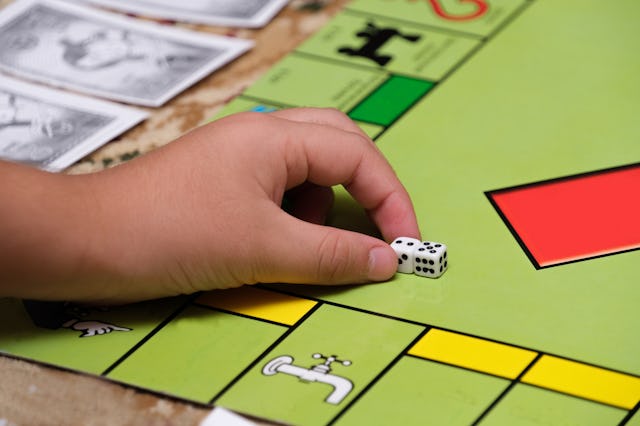PSA: You're Probably Playing Monopoly Wrong
From what happens when you land on Free Parking to jail etiquette, a board game expert sets the record straight.

When it comes to board games, you can't get much more classic than Monopoly. And, surely, after years of duking it out over Park Place with your ultra-competitive family, you've got the rules down pat... right? Well, prepare for a shocker — as it turns out, a lot of us are likely playing this old favorite wrong. In fact, according to one board game expert, there are at least 10 made-up Monopoly rules used regularly enough that they require a little debunking.
Amy Crook, editorial chief and board games expert at GameRules.com, is out to set the record straight. Here are the mistakes she most often sees families make with Monopoly.
When you land on Go, you collect $200 — and only $200.
One big game edit is to bump up how much money gets collected when you land on Go. Some families double it up to help younger players.
"A common house rule is that if you land directly on Go, you receive $400 from the bank rather than the standard $200," Crook says. "While this may have helped you out of sticky situations in previous games, it is not actually a rule and only serves to make the game longer than it needs to be."
Meanwhile, you don't collect anything when you land on Free Parking.
Wait... what?! Is Crook saying fines and taxes don't go into the "free parking" fund for players to collect when they land there? Yup, that's apparently exactly what she's saying.
"Any in-game fines should be paid directly to the bank, and the Free Parking square should serve only as a 'resting place' if a player lands on it, according to the rule book."
When you land on a property, you can't just pass on it.
Many players believe if you land on a property and don't want to buy it, it's OK to go to the next player's turn. But that's not at all how this is supposed to work.
Instead, if a player doesn't want to buy an unowned property or utility they've landed on, it should go up for auction. "Every player can then bid on it, including the player who originally passed on buying it," explains Crook. "Any player can set the starting bid, and the property is then purchased by the subsequent highest bidder."
You absolutely can collect rent — and more — when you're in jail.
It's a common misconception that if you're in the slammer, you can't do anything until you get out. However, rules dictate that you can collect rent while in jail. You can even buy and sell property!
One caveat, says Crook: "Regardless of whether you are in jail or not, if you fail to notice a player has landed on your property, you cannot then ask them for rent once the next player has already rolled the dice."
Unless you roll doubles or have a get-out-of-jail-free card, you've got to pay up.
We all know that you can get out of jail by rolling doubles, yeah? And that if you don't roll doubles, you can just stroll right out after three rolls. Not so fast! "The rules actually state that on your third roll, you must still pay a $50 fine to the bank before moving your piece out of jail," says Crook.
You can "mortgage" property to the bank.
Need some fast cash? You can "mortgage" an un-updated property to the bank. At that point, though, they'll collect rent when other people land on the property. To "unmortgage" your property and start collecting rent, again, you'll need to buy back your property at the price on the card, plus 10% interest.
You don't have to wait until your turn to build houses.
Many players believe you can only build houses and hotels on properties when it's your turn. That's not entirely true. Once you own the entire color block, you can put houses on the properties whenever you want. Well, almost: "You can't, however, build houses on one of your properties if a player has already landed on it."
You must build evenly across the block.
Some families consider it OK to add a home or hotel to just one property on a block. The official rules say players must build houses evenly across their properties on a color block. "For example, you are not allowed to build a hotel on one green property and only one house on the other two green properties."
Take note, too: If you've mortgaged a property to the bank, you cannot build on it until you unmortgage it.
Properties don't go to the bank when a person goes bankrupt.
If a player lands on one of your properties and can't make enough moves to make money and pay rent to you, they'd go bankrupt. Here's the twist that's often missed: "If you are the one to bankrupt them, you acquire all their mortgaged properties, rather than these properties going back to the bank," says Crook. "When you acquire another player's mortgaged properties, you must immediately either pay the bank 10% interest on each mortgaged property or pay to unmortgage each property."
Properties only return to the bank when the player can't pay fines or taxes.
The game doesn't end until only one person is left.
Monopoly can sometimes feel like it lasts forever. As a result, many families or gaming groups end the round as soon as the first person goes bankrupt. In that case, the winner is usually the one left with the most money. However, official Monopoly rules state that "the game only ends when one player is left, and everyone else has gone bankrupt."
This article was originally published on